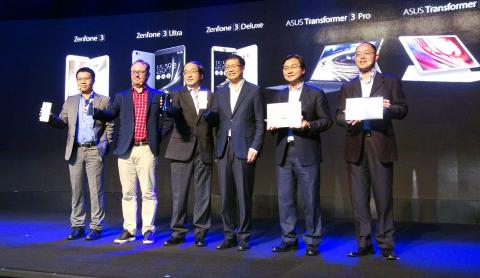Asustek Computer Inc (華碩), the world’s fourth-largest PC vendor, is accelerating the development of its robotic and virtual reality (VR) segments to offset the continued weakness in the PC and tablet businesses.
Asustek’s tablet unit used to contribute more than 20 percent of the company’s total revenue, and the employees of the unit account for more than 10 percent of the firm’s total headcount, but the tablet business is declining faster than the company’s estimate, Asustek chief executive officer Jerry Shen (沈振來) said.
“We have been reallocating resources, engineers and software developers from our tablet unit to the robotics, VR and AR [augmented reality] teams to enhance the new businesses,” Shen told reporters after an investors’ conference on Friday.

Photo: CNA
To step up development of Asustek’s first robot, Zenbo, the company held a software development conference last week to call on outside developers to join the team to enrich Zenbo content, Shen said.
Asustek plans to launch the product in Taiwan at Christmas this year and on the Chinese market in the first quarter of next year, Shen said.
Zenbo is scheduled to arrive on the US market by the second quarter of next year, Shen said.
“Shipments of Zenbo are likely to pick up from the second quarter of next year and make sales contributions,” he added.
In addition to robotics, Asustek sees the growing VR and AR industries as part of the company’s growth drivers, Shen said.
Shen said Asustek plans to unveil total solutions for VR — a headset and joystick bundle with Asustek’s desktop — at the Consumer Electronics Show in Las Vegas next year.
Asustek’s VR total solutions is likely to be similar to Sony Corp’s PlayStation virtual reality console, though Asustek’s package might cost more than its Japanese counterpart, Shen said.
However, the price will be competitive because Asustek’s product can be used as a desktop computer, while Sony’s PlayStation is only a game console, Shen added.
The company also wants to differentiate its VR applications from content platforms, Shen said.
Asustek is in talks with mainstream VR content platform providers, such as SteamVR, Oculus and Tencent VR (騰訊), to jointly build content for Asustek’s VR solutions, Shen said, adding that the company is also mulling developing its own games.
While the company’s package is to be PC-based, its AR solutions are to be mobile-based, Shen said.
The company is collaborating with an international company to build mobile AR applications, Shen said, adding that its first AR application is likely to be similar to Pokemon Go.

MULTIFACETED: A task force has analyzed possible scenarios and created responses to assist domestic industries in dealing with US tariffs, the economics minister said The Executive Yuan is tomorrow to announce countermeasures to US President Donald Trump’s planned reciprocal tariffs, although the details of the plan would not be made public until Monday next week, Minister of Economic Affairs J.W. Kuo (郭智輝) said yesterday. The Cabinet established an economic and trade task force in November last year to deal with US trade and tariff related issues, Kuo told reporters outside the legislature in Taipei. The task force has been analyzing and evaluating all kinds of scenarios to identify suitable responses and determine how best to assist domestic industries in managing the effects of Trump’s tariffs, he

TIGHT-LIPPED: UMC said it had no merger plans at the moment, after Nikkei Asia reported that the firm and GlobalFoundries were considering restarting merger talks United Microelectronics Corp (UMC, 聯電), the world’s No. 4 contract chipmaker, yesterday launched a new US$5 billion 12-inch chip factory in Singapore as part of its latest effort to diversify its manufacturing footprint amid growing geopolitical risks. The new factory, adjacent to UMC’s existing Singapore fab in the Pasir Res Wafer Fab Park, is scheduled to enter volume production next year, utilizing mature 22-nanometer and 28-nanometer process technologies, UMC said in a statement. The company plans to invest US$5 billion during the first phase of the new fab, which would have an installed capacity of 30,000 12-inch wafers per month, it said. The

Taiwan’s official purchasing managers’ index (PMI) last month rose 0.2 percentage points to 54.2, in a second consecutive month of expansion, thanks to front-loading demand intended to avoid potential US tariff hikes, the Chung-Hua Institution for Economic Research (CIER, 中華經濟研究院) said yesterday. While short-term demand appeared robust, uncertainties rose due to US President Donald Trump’s unpredictable trade policy, CIER president Lien Hsien-ming (連賢明) told a news conference in Taipei. Taiwan’s economy this year would be characterized by high-level fluctuations and the volatility would be wilder than most expect, Lien said Demand for electronics, particularly semiconductors, continues to benefit from US technology giants’ effort

‘SWASTICAR’: Tesla CEO Elon Musk’s close association with Donald Trump has prompted opponents to brand him a ‘Nazi’ and resulted in a dramatic drop in sales Demonstrators descended on Tesla Inc dealerships across the US, and in Europe and Canada on Saturday to protest company chief Elon Musk, who has amassed extraordinary power as a top adviser to US President Donald Trump. Waving signs with messages such as “Musk is stealing our money” and “Reclaim our country,” the protests largely took place peacefully following fiery episodes of vandalism on Tesla vehicles, dealerships and other facilities in recent weeks that US officials have denounced as terrorism. Hundreds rallied on Saturday outside the Tesla dealership in Manhattan. Some blasted Musk, the world’s richest man, while others demanded the shuttering of his